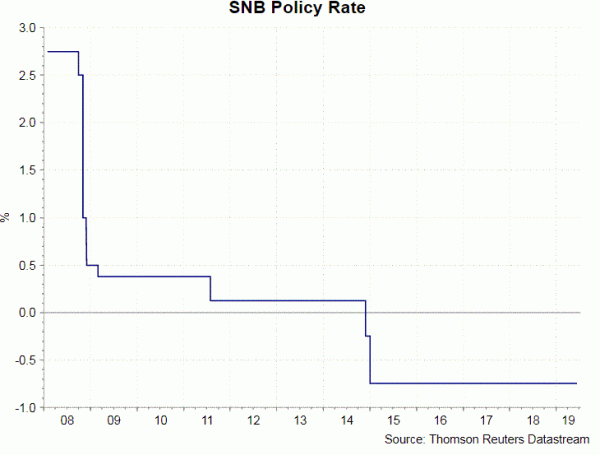In its quarterly meeting, SNB announced to leave the policy rate – the interest rate on sight deposits, unchanged at -0.75%. On a technical change, the central bank introduced a new benchmark – the SNB policy rate- in replacement of the 3-month LIBOR. The members acknowledged recent strength in Swiss franc, attributing it to safe haven demand amidst uncertainty in the US-China trade war. The central bank reiterated the stance to maintain the exceptionally low interest rate and intervene in the currency market when needed. Despite foreseeing greater downside risk, SNB has not revised lower its GDP growth forecasts. For inflation, it slightly upgraded the projection for 2020 but downgraded it for 2021.The overall tone is not much dovish than the previous one. This is likely a reason for the strength of Swiss franc against the Euro after the announcement.
Trade War Uncertainty Led to Stronger Franc
At the meeting, SNB announced a new policy rate to replace the previous benchmark of 3-month LIBOR, as UK’s Financial Conduct Authority will only ensure LIBOR is maintained through to the end of 2021. We believe this is merely a technical adjustment. The central bank noted that escalation of US-China trade ward has raised demand for safe haven asset, leading to recent appreciation in Swiss franc. At the press conference, Governor Thomas Jordan indicated that “when the trade dispute between the U.S. and China escalated again in May, the Swiss franc and the Japanese yen appreciated” as “both currencies are sought as safe havens in periods of uncertainty”. He reiterated that “willingness to intervene remains necessary” in light of “the high valuation of the franc and the fragility of the situation”. At the policy statement, SNB again pledged to “remain active in the foreign exchange market as necessary, while taking the overall currency situation into consideration”.
Note: our company created a profitable forex robot with low risk and stable profit 50-300% monthly!
Economic Outlook
On the economic outlook, SNB foresaw more downside risk, warning that “an unexpectedly sharp slowdown internationally would quickly spread to Switzerland”. Yet, it maintained the estimate that economy would grow by around +1.5% this year. On inflation, the forecast for 2019 was revised higher to +0.6% y/y from +0.3% previously. This is to reflect the “rise in the prices of imported goods”. Inflation forecast for 2020 is also revised slightly higher to +0.7% y/y from March’s +0.6%. Yet, the forecast for 2021 take lower to +1.1% y/y, compared with +1.2% projected in March.
What Next?
Our concern is what action SNB can take if Fed and EUR ease further. We believe SNB would first intervene the currency market to stabilize Swiss franc. If this is not enough, the central bank would be obliged to cut interest further. However, SNB, like ECB, has already been adopting negative interest rates for years. SNB has to consider the impacts of negative interest rates on the profitability of the banking sector.


 Signal2forex.com - Best Forex robots and signals
Signal2forex.com - Best Forex robots and signals




